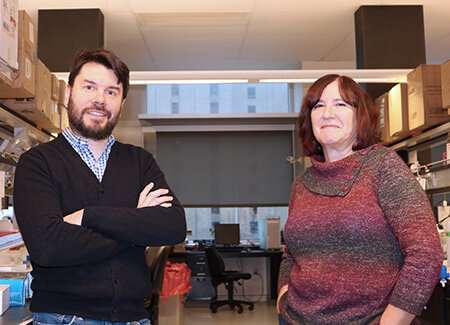Source: Thailand Medical News Jan 12, 2020 6 years, 2 weeks, 1 day, 17 hours, 25 minutes ago
Medical scientists at Rutgers University-Newark have discovered that when a key protein needed to generate new
brain cells during prenatal and early childhood development is missing, part of the
brain goes haywire, causing an imbalance in its circuitry that can lead to long-term cognitive and movement behaviors characteristic of
autism spectrum disorder.
 Dr Juan Pablo Zanin, Rutgers-Newark research associate, and Dr Wilma Friedman
Dr Juan Pablo Zanin, Rutgers-Newark research associate, and Dr Wilma Friedman
, professor of cellular neurobiology, are studying a protein that may be linked to
autism and neurological diseases like Alzheimer's. Credit: Rutgers University
Dr Juan Pablo Zanin, Rutgers-Newark research associate and lead author on a paper published in the
Journal of Neuroscience told
Thailand Medical News, "During
brain development, there is a coordinated series of events that have to occur at the right time and the right place in order to establish the appropriate number of cells with the right connections. Each of these steps is carefully regulated and if any of these steps are not regulated correctly, this can impact behavior."
Dr Zanin has been working with Wilma Friedman, professor of cellular neurobiology in the Department of Biological Sciences, studying the
p75NTR protein needed to regulate cell division, to determine its exact function in
brain development, gain a better understanding of how this genetic mutation could cause
brain cells to die off and discover whether there is a genetic link to
autism or neurological diseases like Alzheimer's.
Though
p75NTR is not a gene specifically linked to
autism, it is a part of a family of proteins needed for
brain cells to develop, function and survive. The exact timing of the expression of this protein is critical.
Dr Friedman, coauthor of the study added, "This protein has been examined in regard to
neurodegeneration as occurs in Alzheimer's disease and cell death after
brain injury. But it has not been looked at regarding the importance it has in generating new neurons."
Conducting research in the laboratory with genetically engineered mice, the Rutgers-Newark scientists found that mice without the
p75NTR protein had more
brain cells than should normally exist causing problems in the cerebellum, the working unit of the
brain that regulates movement and balance as well as cognitive function, and is one of the key
brain regions affected by
autism.
For the study, researchers trained mice with and without the
p75NTR &l
t;/strong>protein to associate a quick puff of air with a blinking light. Mice with the protein learned to blink and shut their eyes when they saw the light while mice without the protein did not.
Past scientific studies have found this same learning deficit in mice with mutations in genes that are associated with autism.
Centers for Disease Control and Prevention says that about one in every 59 children in the U.S. is diagnosed with autism, up from one in every 150 in 2000. Although symptoms vary, the disorder causes difficulties in social interactions with others and often results in repetitive behaviors, speech issues, memory problems and difficulties in understanding non-verbal cues.
While medical scientists have no clear answer as to the consequences of a brain with too many neurons, autism, primarily a genetic disease, has been associated with an unusually large brain size and some scientists think that early brain overgrowth could be a marker for the disorder.
Dr Friedman added, "It is important to understand how the brain's circuitry is built and how it regulates behavior normally. This research shows us that when it is not generated properly it is going to have an impact on many behaviors."
Reference : Juan P. Zanin et al. The p75NTR Influences Cerebellar Circuit Development and Adult Behavior via Regulation of Cell Cycle Duration of Granule Cell Progenitors, The Journal of Neuroscience (2019). DOI: 10.1523/JNEUROSCI.0990-19.2019
